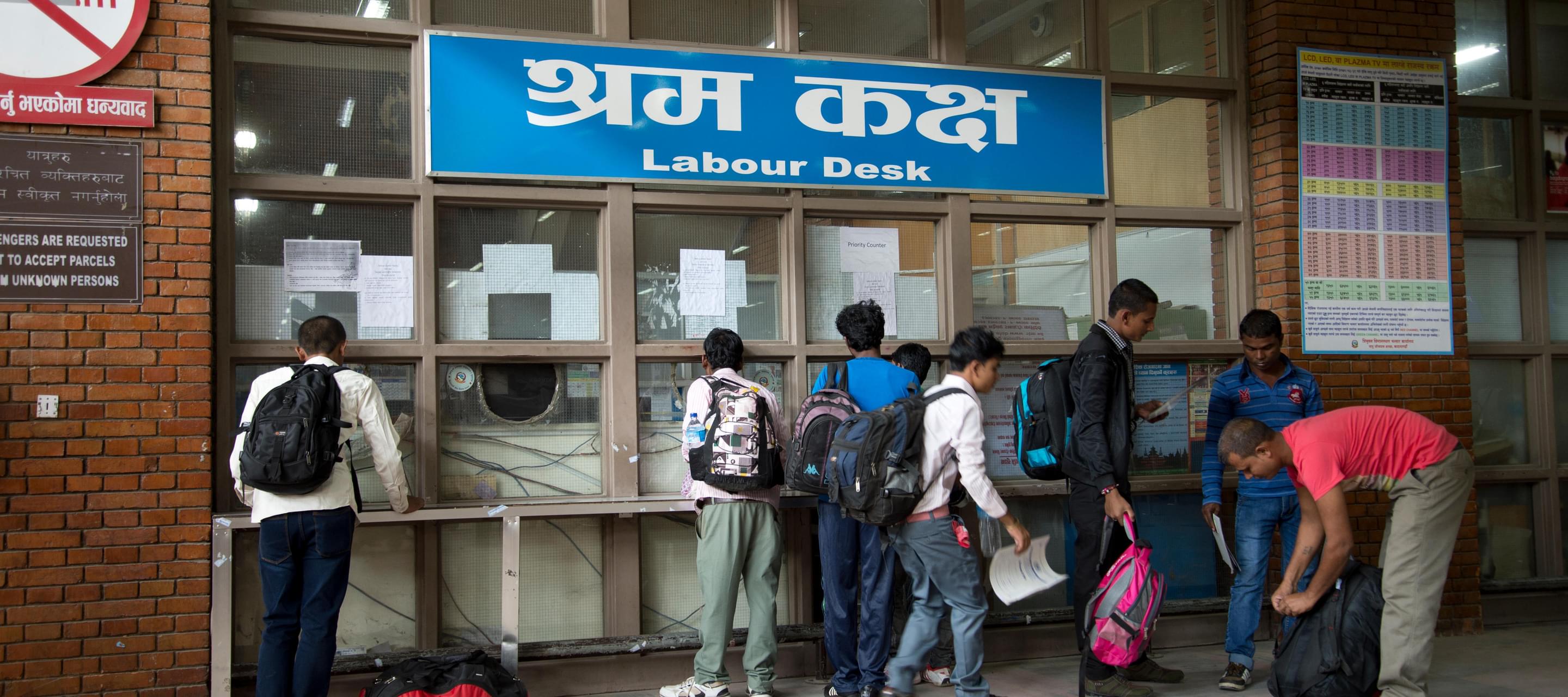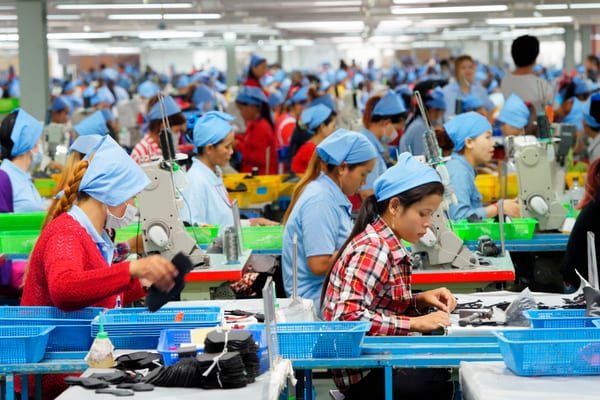Recruitment fees are holding back sustainable development - how can this practice be stopped?
20 October 2023

Migrant workers sending money to home countries and communities can be an enormous driver of development. But ongoing exploitation of migrant workers during recruitment places severe limits on the benefits of migration.
In 2023, remittances - money sent to home countries by migrant workers - are anticipated to reach US$840 billion globally. It is estimated that remittance flows to low- and middle-income countries will increase to $656 billion.
The enormous potential of remittances to positively impact development has been well documented. But an ongoing problem still needs to be tackled. How can the international community end the practice of worker paid recruitment costs that considerably reduce the positive outcomes of the remittance transfer?
Migrant remittances can play a pivotal role in uplifting individuals, families, and entire regions by fostering economic growth, alleviating poverty, improving access to education and healthcare, and ultimately contributing to recipient nations' overall well-being and progress. In terms of absolute numbers, in 2022, India received more than $111 billion as remittances amounting to 3.3% of GDP. In some countries of origin this can be much higher. For example, more than half of the GDP of Tajikistan (51% ) in 2022 came from remittances.
And yet, when leaders met at the High-level Political Forum (HLPF) on Sustainable Development in September - the midpoint of the implementation of the UN Sustainable Development Goals (SDGs), a crucial challenge was missed, one which severely undermines development gains from remittances. The need to end the practice of worker paid recruitment fees, an unethical and often illegal practice that sees migrants charged to secure jobs, was omitted from both the HLPF political declaration and the Statement by the UN Network on Migration.
The burden of recruitment fees
The substantial burden of recruitment costs borne by migrant workers significantly dilutes the value of time spent earning money, and diminishes the positive influence that remittances could otherwise have on the development of individuals, families and communities.
The continuation of recruitment costs has a multi-faceted rationale. Many businesses fear that assuming responsibility for recruitment fees will impose a serious financial burden on their operations. Recruitment agencies are hesitant to end worker payments, which limit the potential for hidden profits. Governments, especially those of major sending regions, often fear that implementing zero recruitment costs will adversely impact emigration, subsequently affecting remittance transfers. Above all, the lack of awareness among migrant workers regarding recruitment fees ultimately serves as an inevitable blocker to prevent fees.
Recruitment costs vary according to sector and country. Gender is also a factor, with women migrant workers often being restricted to certain sectors and lower paying positions. Those migrant workers who relocate to high-income countries with comparatively higher minimum wages often find themselves burdened with elevated recruitment fees. The costs charged to workers often go far beyond the genuine costs of recruitment and deployment and in some cases may total the equivalent of up to 24 months’ salary.
Migrant workers take different steps to pay recruitment costs. Some sell their assets or those belonging to their families, such as jewellery, land, or dowries to pay required fees. Others resort to borrowing from moneylenders at high interest rates or seek financial assistance from friends and relatives.
While most recruitment cost-related calculations are based on actual money paid by workers to achieve employment overseas, the analysis often ignores interest paid on these loans. Considering this, the intensity of recruitment cost-related burdens increases significantly, and hinders the development potential of remittances.
Recruitment costs often create a dual responsibility for workers. While their families struggle with local moneylenders and negotiate high-interest rates, migrant workers in distant countries often experience psychological trauma and insecurity to maintain employment.
The Employer Pays Principle
Responding to these burdens on migrants and their families requires full application of the employer pays model, which shifts responsibility for recruitment related costs to employers. If adopted, the Employer Pays Principle, which affirms that no worker should pay recruitment fees no matter where they work in supply chains, holds the potential to instigate significant changes in the creation of an open, enabling, and skill-focused migration process. These pathways would give precedence to safety and efficiency, ensuring the protection of migrant workers' rights, ultimately maximising socio-economic benefits, and contributing to achievement of the SDGs.
Making this shift involves effective efforts to end flawed practices, weak enforcement, and regulatory loopholes. The payment of recruitment fees is a reality, and businesses need to regard this as an open challenge. The conventional strategy of shifting responsibilities and disowning the supply chain cannot be extended any further. The lack of direct engagement by businesses in the recruitment process and the over-reliance on a lengthy profit-making, chain-based recruitment, involving an increasing number of actors such as HR consultants, recruitment agencies, sub-agents, or sub-sub-agents, create an excessively costly and exploitative recruitment cycle for migrants. Furthermore, the existence of information asymmetry among the workforce exacerbates the prevailing issue. Specifically, migrant workers may lack familiarity with their entitlements, thereby rendering them susceptible to exploitation through the imposition of recruitment fees.
Raising awareness and promoting responsible recruitment is crucial to making progress. Coordinated international efforts are needed to strengthen regulations and highlight reforms . Governments, businesses and recruitment agencies in particular must step up their individual and collective efforts.
Reflecting the Dhaka Principles for Migration with Dignity and adopting the Employer Pays Principle is fundamental to combatting exploitation, forced labour and trafficking of migrant workers. One example of where promoting responsible practice is taking hold is through the Global Forum for Responsible Recruitment (GFRR). The GFRR is a thought leadership platform for accelerating the responsible recruitment of migrant workers around the world, in line with the Employer Pays Principle. Facilitated by IHRB in collaboration with various partners annually, the forum focuses on thought leadership, convening stakeholders, networking, and shared learning to enhance recruitment regulations, eliminate worker-paid fees, encourage commitments, and foster a responsible, sustainable, fair, and ethical recruitment industry for migrant workers.
IHRB’s Responsible Recruitment Register is helping track corporate progress to eliminate recruitment fees in supply chains. The register lists brands now committing to eliminate recruitment costs, and amongst these many are also committing to the employer pays model. The Register is intended to increase transparency around companies’ recruitment policies and adherence to the Employer Pays Principle. The Register also supports efforts aimed at strengthening accountability for existing commitments, and encouraging other companies and associations to introduce similar policies in their operations, codes of conduct, or certification standards.
Recruitment is a business cost and should be paid by each business. Making the Employer Pays Principle standard business practice would protect vulnerable workers, and maximise the gains that employment abroad may bring to individuals, families, communities, and national economies. Ending worker paid recruitment fees represents a golden opportunity to help achieve the SDGs before it’s too late.




